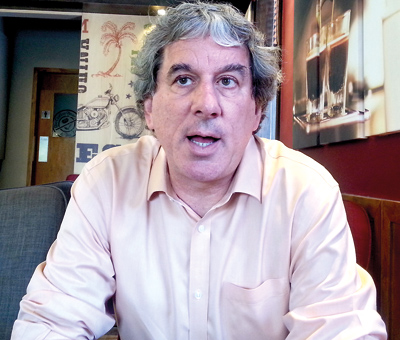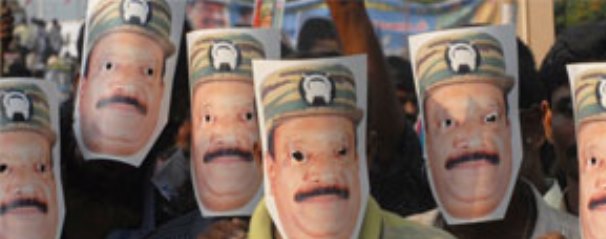In a wide ranging interview, Human Rights Watch Asian chief Brad Adams says that under Mahinda Rajapaksa, there was only “victor’s justice”, whereas today there appears to be “justice for all communities”
Many in the United States administration had resisted the proposal for a resolution on Sri Lanka at the UN Human Rights Council but Robert O. Blake, former US Ambassador in Colombo, pushed it after he was promoted to Assistant Secretary of State, an international rights advocate said this week.
Brad Adams in Colombo: “You can’t put every soldier that committed every crime on trial. It would never end.”
The US might even have given up calls for justice had Sri Lanka’s former Government shown genuine commitment to reconciliation, said Brad Adams, Executive Director of Human Rights’ Watch’s (HRW) Asia Division, in an interview with the Sunday Times. He was in Colombo for meetings.
There were different elements in the US Government. “Some people never liked this process, did not want a resolution, were worried about what India thought, were worried about what China thought, and were worried about the Chinese role,” Mr Adams revealed.
“There were people in the US who were looking at it only from the prism of China. Is this going to weaken the US Government’s relationship with Sri Lanka and empower China and its role?”
There were others who thought any effort would be a waste of time. A minority wanted a resolution in the UN Human Rights Council.
“The person who was responsible for the change in US policy was Bob Blake, who was Ambassador here,” Mr Adams said. “He really wanted to give the Rajapaksa Government time.

And only when he realized that they were lying to him, not just about justice, but about reconciliation…I think if they had done the reconciliation side well, the justice side would have been given up by the US. They would have taken reconciliation.”
“They would have said, ‘Let’s move forward, the (Sri Lankan) Government’s moving forward. It’s been working on community relations, it’s investing in Tamil communities, it’s taking the army out of Tamil areas, it’s not stealing their land, it’s creating political institutions that will allow them to be properly represented’,” he continued.
“I think Bob Blake and the US Government would have just let the past be the past.”
But Mr Blake realized he was being lied to. “And that put the justice question back on the agenda for him,” Mr Adams said. “When he became Assistant Secretary of State and he was in a stronger position to do something about it on a policy level, he pushed this through very hard. So it’s all very complicated. I think he felt it’s not good to lie to people. They lied to him.”
Mr Adams said that the discussion about the end of Sri Lanka’s war would have changed dramatically had the “white flag incident” not happened.
He said liquidating the LTTE leadership and thereby ensuring that they were not available for prosecution was “a terrible historical mistake made by the previous Government”.
The LTTE should have been put on trial, he maintained. “It would have shown that they (Government) were the just party,” he said.
“That justice could have been done and be seen to be done. Frankly, I would have loved to have seen the Tiger leadership on trial because it would have brought a lot of facts about what they did, in detail. They (Government) chose to kill them instead.”
Any judicial process that is now set up in Sri Lanka will necessarily have to take up a finite number of cases. That was the experience of other countries.
“You can’t put the whole country on trial,” Mr Adams said, explaining that there would be a capacity issue. “You can’t put every soldier that committed every crime on trial. It would never end.”
No fair observer would say the LTTE does not deserve at least half of the blame for the war, he averred: “I wish we could see them. I wish we could see their leadership in the dock. And, by the way, we called for that. We were never taking sides.”
“We always called out the LTTE, to the point that I was threatened by them,” Mr Adams said. “We had threats to our office. I would speak at public forums in London where I was living and members of the Tamil diaspora would come and scream at us and threaten us.
It was only in late 2008, when we started criticizing the conduct of the war, that the Government went from praising us.”
“The Rajapaksa administration loved Human Rights Watch and other groups because of our criticism of the Tigers,” he said.
“I was embraced by your diplomats and by Government ministers. Mahinda Samarasinghe would say, ‘Thank you Mr Adams, you’re doing great work’. And then they didn’t like the fact that we then used the same principles to look at what they were doing.”
There was significant interest in the end of the war—as opposed to three decades of conflict—because it was “extremely political in Sri Lanka”. “We didn’t make it political, but it was Sri Lanka which made it political,” Mr Adams said.
“It polarized the country.” Parties had different views about the efficacy of the offensive. There were disagreements about the conduct of the war.
“When so many civilians were killed, there was a controversy about what to do about it,” he continued. “The Rajapaksa Government refused to accept it.
They kept saying for years there was ‘zero civilian casualties’ so it was laughable and when you say things that ridiculous, it invites controversy. If they had been a responsible Government, they would have accepted there were a lot of casualties.”
Mr Adams said the LTTE leadership was awful: “Even at the worst times of the war, I started by saying how awful I thought the Tiger leadership was. They lost all credibility.
I no longer cared about their political demands because of the way they were operating. You couldn’t take their political demands and separate them from what they did and I used very strong language all the time about them being totalitarian.
Not authoritarian, not repressive, but a totalitarian (group) that intended to brainwash and control their entire population whatever way Prabhakaran wanted to go. It will be a disaster if people forget.”
Mr Adams warned there was no system that will be able to address all concerns of all victims. What proved important in a lot of countries was for people in charge of either side to take responsibility, to admit; to organize compensation ceremonies and memorials so that victims who are not getting individual justice felt like there is recognition of what happened. Studies in other countries have shown this helps.
Under Mahinda Rajapaksa, there was “victor’s justice”. “The worst thing that happened since the end of the war was that only one side, the winner’s side, of the story,” Mr Adams reflected. “The justice process can sometimes lead to multiple stories being told.”
“This Government seems to understand the need for reconciliation,” he said. “So it’s not just victor’s justice. It’s justice for all communities.”
(Original Caption – Robert Blake pushed for US resolution against Lanka at UNHRC ; By Namini Wijedasa)
ST
